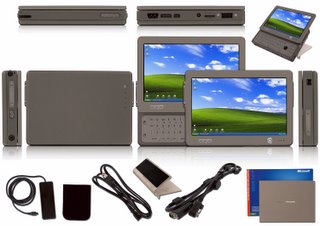
If you live on planet tech you can't help but notice the fuss that the blogosphere has been worked into about a Microsoft project called Origami. Its the biggest thing to hit the street since Apple's fun announcement last week.
Ok, so let's debunk some of the hype:
- Origami is a new product launch: something called the ultra mobile personal computer (UMPC). UMPC has been touted by Intel at developers conferences for a while: so its not really news. In fact you can read here how Intel has already demoed a device last August. And if that's not enough Microsoft launched UMPC devices last April. On another note wouldn't Tablets from the likes of Motion Computing count as a UMPC by their very nature?
- Ah, but this is a new product: no it isn't OQO have had their UMPC device out for over a year. The product design is actually quite nice, in fact if it ran a decent Linux distribution and worked with iSync core services I would be interested in getting one
- Its a new paradigm in computing: err no. Sub-notebooks have existed for years and are very popular in Japan, PDAs do the same job in a more energy and space efficient way, Nokia has the uber cool but hard-to-find 770 device and Psion had a cracking device called the NetBook.
In reality UMPC devices is putting lipstick on a pig. Tablet PCs haven't flourished and the best way to make them cheaper (hence making them more likely to be purchased) is by reducing cost. You can do this by using lower performance parts in the name of energy efficiency, smaller capacity hard drives and smaller displays.
From a marketing point of view I love it, get manufacturers to pay for a full Windows licence which will be dearer than what they would pay for Windows Mobile, reduce the price point of the device and the component cost, give them little point of differentiation and watch them beat each other the price poiint to a pulp and potentially make a new market segment for you. And from a PR person it is a story well-spun; but it's a shame that it doesn't stand up to much examination.
Picture from Expansys.com of the OQO device mentioned earlier.
From a marketing point of view I love it, get manufacturers to pay for a full Windows licence which will be dearer than what they would pay for Windows Mobile, reduce the price point of the device and the component cost, give them little point of differentiation and watch them beat each other the price poiint to a pulp and potentially make a new market segment for you. And from a PR person it is a story well-spun; but it's a shame that it doesn't stand up to much examination.
Picture from Expansys.com of the OQO device mentioned earlier.